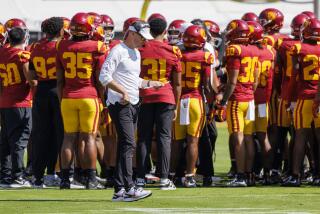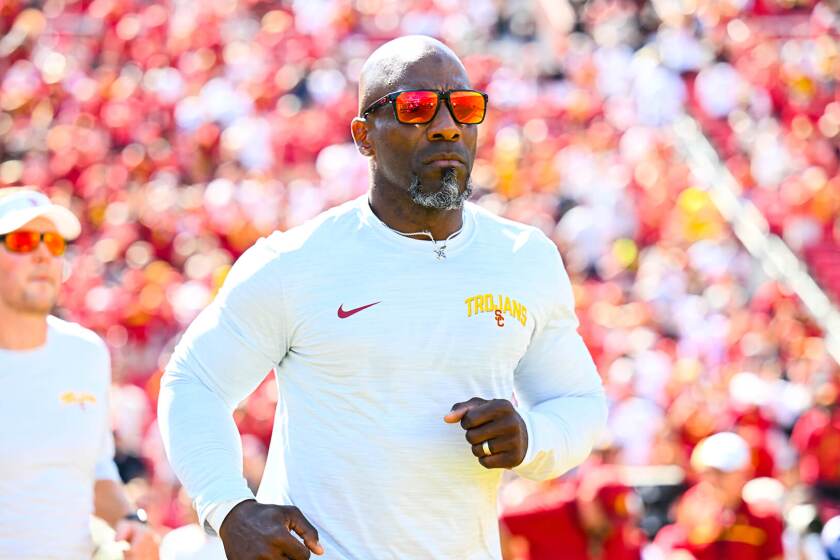He Tackles Sabbath Problem : Trojans: After conversion to Judaism, Caruthers goes from Middle East to outside linebacker.
- Share via
When USC linebacker Gerald Caruthers decided to become a college football player four years ago, his major decision didn’t involve which position to play, or which team to play for.
The problem was when to play.
Saturdays were going to be a problem.
“I really wanted to play college football, but playing on Saturday was a major compromise in my family,” he said.
“My religion says I’m wrong to play football on Saturday. It’s the Jewish holy day. I’m not supposed to do anything on Saturday but be at the synagogue. I’m not even supposed to drive a car.”
The story of Caruthers’ Odyssey, from a small Oklahoma town to a tomato patch on Israel’s Negev desert to the USC football team, is an intriguing one.
Were it not for a two-year drop in the price of tomatoes in Israel in the mid-1980s, Caruthers would probably still be there, driving to and from an Israeli farm, packing a .45 automatic, and perhaps raising a family on an Israeli moshav .
Caruthers, 6 feet 3 and 235 pounds, who will back up starting outside linebacker Brian Williams on Saturday when USC plays Stanford at the Coliseum, was more facile with Hebrew than he was English when he began high school in Oklahoma eight years ago. He found himself taking classroom notes in Hebrew, not English.
His story, though, starts in Owasso, Okla., near Tulsa, where Caruthers’ grandfather, William Caruthers, and two of his sons, Granville--Gerald’s father--and Vincent, had spent most of their lives in the building trades, in carpentry and concrete work.
They were Christians then, with a special interest in Old Testament readings.
“We were so interested in the Old Testament, in the readings of the history of the Jews, that some people in the Christian church we went to felt we should have been reading more of the New Testament,” recalled Caruthers’ mother, Carol.
Gerald Caruthers said his grandfather led the family toward conversion to Judaism in 1975.
“My grandfather had been through ups and downs in his life, he’d never been a rich man,” Caruthers said.
“He wasn’t a highly educated man, but he had a kind of deep sense of history about the Jews, and he wanted to learn all he could about it. His son, my father, felt the same way and we all shared it.
“And Dad came to feel, after we all converted, that if you’re a Jew, you should live in Israel, if you could.”
Gerald’s grandparents were the first to go. They moved to Israel in 1979. William found construction work in Tel Aviv, and his wife, Ola Mae, was a cook at a U.S. Marine Corps installation.
But a year later, when the construction job market declined, the couple returned to Owasso.
There, Gerald’s father was building a house, hoping to sell it and use the proceeds as seed money to start a new life in Israel for his wife and six children, of whom Gerald is the oldest. (A second son, Dan, is a junior center on the Kentucky football team.)
In 1979, the Caruthers family moved to Israel, and as immigrants were assigned to live at an absorption center called Mirkazkleeta.
Gerald, who was 8 at the time, recalls the intense language training.
“There’s a lot of English spoken in Israel, but if you’re going to live there, you have to learn Hebrew,” he said.
“I struggled at first in my classes. I had to stay after school every day for an hour, for Hebrew instruction. In six months, I was fluent, and in 18 months I could read and write with no problems.
“We moved to a moshav , a farming community, in the Negev desert. There were about 30 families there, and we were just getting started in a farming operation when the Camp David treaty was signed, and we had to move out.
“We wound up in an identical place, across the Sinai-Israel border, about 30 miles away.
“We were there six years, and we raised table grapes, tomatoes, flowers for export, mangoes, papayas, sweet potatoes, cucumbers, eggplants and watermelons.”
It was a hard life, but Caruthers remembers it as a rewarding time, his family working together and enjoying the life despite the everyday dangers of the Middle East.
“Every home had at least one automatic weapon,” he said. “We had an M-16 we all knew how to use. When my dad traveled anywhere, he carried a .45 automatic in his waist pack.
“One time, the two of us were coming home in our van on a desert road, and a pickup truck came around the corner. An Arab took a shot at us as they went by.
“That happened a lot, terrorist attacks. I remember being in bomb shelters and having to stay in our house.”
But collapsing tomato prices, not terrorists, drove the family back to the United States.
“There were two years in a row of falling tomato prices, and we lost tens of thousands of dollars,” Gerald said. “We simply ran out of money and had to come back.”
Returning to Owasso at 15, Caruthers enrolled in high school.
And he found himself playing football. He played two years in Owasso before his father found construction work in Southern California and the family moved to West Hills.
Gerald became an all-league linebacker at Saugus High, then played at Pasadena City College. A USC scholarship came next--but only after there had been many family conversations about playing games on Saturdays.
“It was difficult for us, but we kind of balanced it out,” Carol Caruthers said. “It was a way for Gerald to get a college education.”
Gerald wants to return to Israel, after a hoped-for career in the NFL.
“After you’ve played football at this level, you want to try the next level,” he said. “Anyone who says no to that is lying. I hope I get a chance.
“But eventually, I will return to Israel to live. I still write letters in Hebrew to kids I knew there.”
He was asked what his life would be like today, had his grandfather not steered his family to Judaism in the 1970s.
“I can’t imagine,” he said.
“I’m sure my life would be a lot more boring. Israel was a great experience for me and my family. That’s why we’re going back.”
More to Read
Go beyond the scoreboard
Get the latest on L.A.'s teams in the daily Sports Report newsletter.
You may occasionally receive promotional content from the Los Angeles Times.





